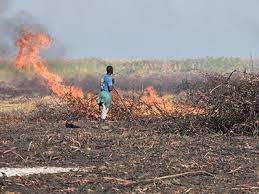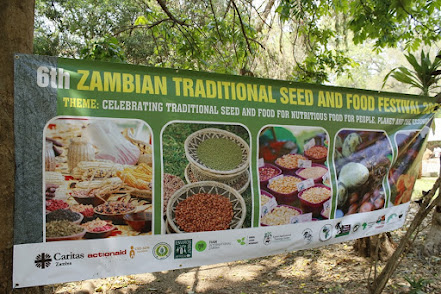DON'T BURN YOUR FIELDS ,FARMERS TOLD
 |
| PC: International Crane Foundation |
The picture above is for illutration purposes
Petauke District of Eastern province which is an agricultural area where farmers produce maize, cotton, sunflower, groundnut, soya beans and many other crops is located 425 kilometres from the capital city Lusaka, roughly halfway between Lusaka and the Malawi border has not been spared from the negative impact of climate change through increased drought, extreme weather events, and flash floods.
climate shocks will progressively increase with time in Zambia.This reality show the need to invest in the key drivers of agricultural development that enhance pro-poor growth and resilience,according to the Zambia Agriculture Status Report 2021 released by Indaba Agricultural Policy Research Institute.
Smallholder farmers are among the most vulnerable groups that have been hit hard by climate change thereby posing a serious threat to food security at the household national security levels.
Despite
this fact, some farmers are still lacking adequate knowledge on what climate
change is to enable them mitigate its negative impact.
But for
those who have embraced a combination of organic and conservation farming, the
situation is much better as they are able to respond to the climate change
phenomenon.
Nalesti Sakala is based in Petauke district and is one of the small scale farmers who is using both organic and conservation farming to counter climate changes and its devastating impacts.
Nalesti narrates that her crop yields are higher when she applies organic manure in her fields compared to when she uses chemical fertilizers.
“I
do not use chemical fertilizer, I use organic manure but still my yields
are more than enough to feed my family and sale the surplus,” she said.
She
however, complained that “one of the challenges am facing is the lack of support
on what other measures I can apply to respond to effectively to climate change“.
“If
we farmers can be sensitized on what other activities we can engage in to
cushion the impact of climate change that could be appreciated.”
Below is the video clip of Nalesti explaining how the use of organic manure is helping her
Another farmer, Enelesi Sakala also based in Peatauke district said she rarely has access to chemical fertilizers and so she uses animal manure which has so far proved to be sustinable.
“Like
this year,although we experienced flash floods, our harvest was not really
affected because we managed to make 8 bags of organic manure, this really
helped us.”
Below is vidoe clip of Enelesi
Research shows that organic and sustainable techniques bring additional benefits for farmers, such as increased soil health and fertility, which leads to additional climate-friendly benefits.
Further the Food and Agriculture Organisation-FAO acknowledges that organic agriculture has a role to play in climate change adaptation and mitigation, including avoided damage, and many farming practices contribute to both processes.
Other
reseachers have indicated that Organic agriculture helps farmers adapt to climate change because
high soil organic matter content and soil cover help to prevent nutrient and
water loss and this makes soils more resilient to floods, droughts, and land
degradation processes.
In this regard,the Zambia Alliance for Agro ecology and Biodiversity-ZAAB has been firm in advocating for agro ecology farming which aims at promoting sustainable food systems, and respect for people and the environment.
ZAAB, an advocacy network of faith, farmer and civil society organizations, committed to a common cause of realising a just and sustainable food and agro-ecological system in Zambia, is therefore urging farmers to avoid burning their fields as doing so destroys the organic matter and crop residues that make the soil fertile hence making it difficult to respond to climate change.
Alliance National Coordinator, Mutinta Nketani has advised farmers to embrace organic farming and begin to prepare their compost manure ahead of the next farming season amid the high cost of fertilizer in the country.
Ms Nketani said this will enable them to respond effectively to several factors that are currently posing a serious threat to the country's food production citing climate change as the major threat.
Ms
Nketani noted that the increase in the price of fertilizer and fuel prices
mainly affecting farmers who are into mechanized agriculture coupled with poor
rainfall patterns are likely to have a negative
bearing on the country's food production if left unchecked.
“Zambia
is currently grappling with high cost of fertilizer, fuel poor rainfall pattern
and there is likely to be some food shortages in some parts of the country. So
what we think farmers should do is that one, they must not burn their field
this year, they should start building organic matter into their soil. They must also save all the grass and crop residues and plough them back in their fields. Those
that have manure,they must harvest and cover it because if you leave manure in the open
most of its nutrients escapes. So collect manure and cover it up to preserve nutrients in
preparation for the next farming season,” she explained.
She
has also appealed to the government through extension officers to take a lead
in sensitizing farmers on how they can make compost manure for their fields.
According
to an article posted on the World Bank website titled Climate Smart Agriculture,”
agriculture is a major part of the climate problem. It currently generates
19–29 percent of total greenhouse gas-GHG emissions. Without action, that percentage
could rise substantially as other sectors reduce their emissions.”
“Agriculture
activities contribute to climate change and we are aware that climate change is
affecting agricultural productivity and production, especially for small scale
farmers. How does agriculture contribute to climate change? The easier way to
explain this is the slash and burn agriculture, where we cut trees from the
forest so that we can plant crops. So as we do that we are taking away the
natural carbon sequestration system (the process of capturing and storing atmospheric
carbon dioxide. It is one of the methods of reducing the amount of carbon dioxide in
the atmosphere to reduce global climate change), because as you may be aware
trees or forests need oxygen to survive so if you are cutting trees you
are taking away the carbon absorber, “ Friday Phiri, the ZEMA Corporate Affairs Manager said.
Mr Phiri explained that the role of trees is to absorb carbon that is coming out of various human activities so that the carbon can not find itself in the atmosphere and eventually cause global warming and climate change.
He
emphasized that “it is clear the more land or forests you clear, the more you
open up for the carbon to be released into the atmosphere to cause global
warming.”
He
notes that in the recent past climate change which causes extreme weather
conditions such as floods, and drought has taken a toll on small scale farmers
who rely on rainfed agriculture thereby negatively affecting their yields.
“When
there is drought obvious, it means that our smallholder farmers who rely on
rain for their productivity cannot produce and their crop wilt resulting in
them having no food and what follows is food insecurity, hunger, malnutrition
including lack of income, “he explained.
“Equally
when there are flash floods, their crops are destroyed and the consequences are
similar.
He
urged farmers to embrace the various methods of farming that have been
introduced such as Climate Smart Agriculture-CSA which is defined as “an
integrated approach to managing landscapes—cropland, livestock, forests and
fisheries that address the interlinked challenges of food security and climate
change” to adapt to climate change.
“We
are talking about the use of mulching, the use of manure instead of chemical fertile,
inter-cropping trees with crops. At the end of the day it is to ensure that
whether the country is experiencing drought or flash floods, farmers will be
able to produce enough for consumption and selling,"he said.






Comments
Post a Comment